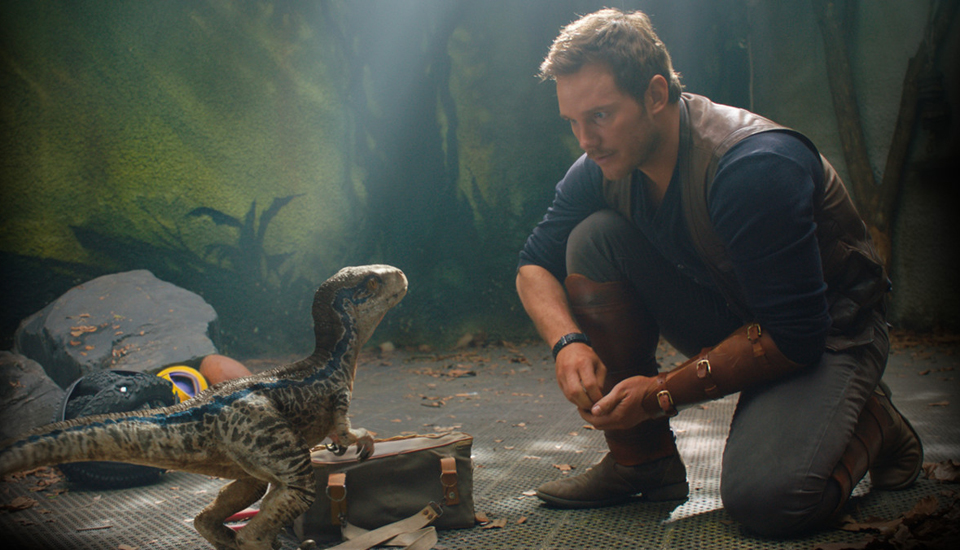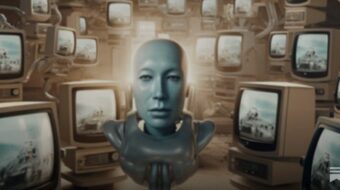
Summer has arrived and that means only one thing here in Hollywood:
Bring out the blockbusters! Jurassic World: Fallen Kingdom is the fifth in the film franchise featuring frenetically, genetically engineered dinosaurs in modern times who run amok, continuing to wreak the havoc that began with Steven Spielberg’s 1993 screen adaptation of Michael Crichton’s Jurassic Park novel, with Crichton’s screenplay.
The extraordinary special effects in this eye-popping big-budget Universal Pictures production directed by Barcelona-born J.A. Bayona are state of the art. Underwater, on the land and in the sky, the dinosaurs at Isla Nubar located off of Costa Rica (but actually largely shot at Hawaii locations, including Kualoa Valley and Halona Cove—see the new edition of The Hawaii Movie and Television Book—seem startlingly lifelike and realistic. Although since none of us were alive during the Paleozoic era, who knows for sure?
Anyway, what do you think the odds are that Kingdom’s dinosaurs get out of control—you know, like they’ve done for the past 25 years in all four retreads? As Dr. Ian Malcolm (Jeff Goldblum) said in 1997’s remake The Lost World: Jurassic Park: “‘Ooh, ah,’ that’s how it always starts. But then later there’s running and screaming.” Why would Tinseltown tamper with the formula for success that has led to boffo box office for a quarter century? Who could have predicted even in their wildest dreams that the monsters from this wild kingdom would go on a rampage? I mean, who’da thunkit? As Owen Grady (Chris Pratt) asks: “What could go wrong?”
Well, if nothing went wrong there wouldn’t be a movie to see (and sell). Personally, I can, as British poet Samuel Taylor Coleridge put it, willingly suspend my disbelief and swallow that 20th-century scientists could conjure up life-size dinosaurs out of dino DNA found in yellow amber. But what I can’t believe is that every time one of these fierce creatures pursues a good guy or gal, the humans manage to get away. While the bad guys, for some strange reason, aren’t quite so lucky. Or when a dinosaur with a terrifying foot-long talon scratches the leg of Bryce Dallas Howard, reprising her role as Claire in 2015’s Jurassic World, she’s up and about again within a few scenes, as if nothing happened.
(Similarly, I’d bought the post-apocalyptic premise of the 1997 epic The Postman in the same way—but only up to a point: I could buy that thermonuclear war destroyed humanity’s technology and social systems. And Kevin Costner tried to revive the federal government by resurrecting the post office. But I put my foot down when the filmmakers tried to make us believe that the reborn U.S. postal service would deliver our mail without customers buying stamps first. That’s simply an inherently incredible plot point that strains credulity.)
The first time one of Kingdom’s dinosaurs opens his genetically modified mouth with teeth sharp as gigantic razorblades in close up it’s genuinely scary. But after the umpteenth time we eyeball this biting bit it becomes as old as the Mesozoic era. Having said that, what makes this monster mash worthwhile is that under the guise of a summertime popcorn muncher at the multiplex, this big screen extravaganza actually has a strong environmental message.
Howard’s Claire Dearing has evolved (no pun intended) from an operations manager of the Jurassic World dino theme park in the 2015 iteration of the series to her current incarnation as the leader of the Dinosaur Protection Group, an eco-organization that’s sort of like an epic-scale PETA on steroids. The DPG is trying to rescue and relocate the remaining dinosaurs from Isla Nubar as Mount Sibo erupts. (This is an eerie motion picture prophecy of the ongoing eruptions of Kilauea volcano on the Big Island of Hawaii, in the island state where much of this film franchise has actually been lensed since 1993.)
In addition to the return of Claire, Goldblum reprises his role as mathematician Dr. Ian Malcolm, an expert in chaos theory. But this time, instead of examining Jurassic Park as an insurance consultant, Dr. Malcolm is seen at least twice testifying before Congress. He counsels a congressman or senator: “These creatures were here before us. And if we’re not careful… they’re going to be here after. Life cannot be contained. Life breaks free. Life… finds a way.”
Like billionaire Benjamin Lockwood (played by one of Hollywood’s most outspoken actor/activists, James Cromwell, who was imprisoned in 2017 for an anti-fracking protest), who is trying to relocate and rescue the endangered behemoths, Malcolm warns about species extinction.
Just as Darren Aronofsky used Biblical parables as a pretext for exploring 21st-century extreme weather in 2014’s Noah and Disney warned about global warming in Moana through the framework of an animated feature, Jurassic World: Fallen Kingdom is a cautionary tale about endangered species in the End Times of climate change under the guise of a summertime blockbuster. These movies serve as coded chronicles, onscreen allegories that reflect our planet in peril. The film warns, “we’re causing our own extinction by way of avarice and political megalomania.”
The sci-fi flick also has a cloning subplot. And there’s a conspiratorial subplot about big game hunting that would make Don Trump Jr.’s mouth water.
Kingdom is notable from a film history point of view, too. Cromwell appears in scenes at Lockwood’s mansion with Geraldine Chaplin, who first gained prominence in the 1965 epic Dr. Zhivago and portrayed an island princess in 1970’s The Hawaiians (which is ironic as so much of the Jurassic franchise has been shot in Hawaii). Chaplin and Cromwell share something in common: Both were children of Hollywood royalty and their fathers were directors (Charlie Chaplin and John Cromwell) blacklisted during the House Un-American Activities witch-hunt and driven out of La-La Land, although neither was a Communist Party member.
There are also classic film references throughout Kingdom. Chaplin’s character looks like Judith Anderson as the ominous housekeeper Mrs. Danvers in Alfred Hitchcock’s 1940 Rebecca. Executive produced by Spielberg, Kingdom also “quotes” scenes from famous movies, including From Here to Eternity (Pratt and Howard wash up on the same exact Oahu beach where Burt Lancaster and Deborah Kerr made out in that WWII-era movie), King Kong and more.
The multi-culti cast includes Asian-American BD Wong reprising his Jurassic Park role as Dr. Wu, British Toby Jones as Mr. Eversol, bi-racial, part-Black Justice Smith as Franklin Webb, and Mexican-American Daniella Pineda as Zia Rodriguez. The movie would have been more diverse, but Zia’s dialogue revealing her to be a lesbian was edited out of the “family friendly” flick.
Jurassic World: Fallen Kingdom’s eco-theme raises it from being just a crowd pleasing special FX-laden spectacle to a more worthy movie meditation upon species going extinct. The trailer can be viewed here.
L.A.-based reviewer/historian Ed Rampell is co-presenting a Paul Robeson birthday celebration with re-enactor K.B. Solomon on June 28 as part of the “Marx @ 200: The Marxist Movie Series.”












Comments